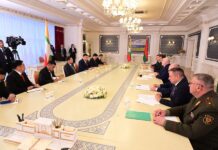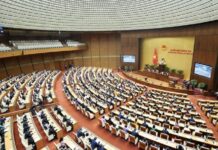Beaucoup d’experts ne ponctuent plus cette affirmation d’un point d’interrogation. Pour eux, la Chine de Xi Jinping, c’est une évidence, est impérialiste. Notre chroniqueur Yves Carmona, ancien ambassadeur de France au Népal et au Laos, a préféré lui s’enquérir auprès d’experts lors de plusieurs «webinaires» organisés par l’université de Singapour. Il partage avec nous ses notes. Avec Gavroche, entrez dans le secret des tables rondes diplomatiques….où tout se dit en anglais !
Une chronique en français et anglais d’Yves Carmona, ancien ambassadeur de France au Népal et au Laos
Le preneur de ces quelques notes a la chance d’assister régulièrement à un « webinar » organisé en anglais par la « S. Rajaratnam School of International Studies » (RSIS) à Singapour car il y a été en poste. Le lecteur intéressé pourra les lire ci-dessous.
Les relations avec la Chine et en particulier son projet de « Nouvelles routes de la Soie » (BRI) sont au centre du débat pour l’Asie du Sud-Est et du conflit avec les États-Unis. La question qui se pose est pour tous : la Chine cherche-t-elle avec la BRI à faire prévaloir son nouvel impérialisme sur celui que les États-Unis ont exercé pendant des décennies ? ou bien le projet de Xi Jinping est-il d’imposer aux pays participants un nouvel ordre autocratique, sous la houlette du parti communiste qu’il dirige ?
Chacun déterminera si on a affaire à un impérialisme traditionnel ou à un processus de codéveloppement entre la Chine et les pays associés.
Pour les pays d’Asie du Sud-Est ou d’Europe, est-il possible, en recherchant une plus grande efficacité des organisations régionales comme l’ASEAN ou l’Union européenne, d’éviter cette opposition entre les Empires américain et chinois ?
Cette difficulté concerne aussi les entreprises, y compris américaines : garder un flux commercial et d’investissement en Chine, qui a beaucoup de moyens, tout en continuant à se plier aux foucades américaines.
*** Les notes en anglais de notre chroniqueur
Compte rendu de deux tables-rondes consacrées à deux livres:
« Critical Reflections on China’s Belt and Road Initiative »
Associate Professor Alan Chong Acting Head of Centre for Multilateralism Studies, S. Rajaratnam School of International Studies and Professor Pham Quang Minh Professor of History and Politics, University of Social Sciences and Humanities (USSH), Vietnam National University-Hanoi
et
« China’s Belt and Road Initiative: Impacts on Asia and Policy Agenda »
Associate Professor Pradumna B. Rana Centre for Multilateralism Studies, S. Rajaratnam School of International Studies et Assistant Professor Xianbai Ji School of International Studies, Renmin University
Ambassador Ong in introduction reminded that BRI started in 2013 as a Xi Jinping Project.
7 years later, BRI has to reorganize itself and the participant countries try to find their way into it. As concerns Singapore, it cannot finance all the projects of BRI but as a business hub, it can work on dispute settlement and financial services. It has the technical skills, the logistical provisions, and so on. BRI can provide opportunities to Singaporean companies.
Presentation by Alan CHONG, RSIS.
It is an important historical moment.
Our book tries to address the Chinese government revisiting Asian history.
The problem of President Trump is that it is together an affirmation of Chinese power and a business opportunity. How to conciliate both ?
It is not imperialism in the traditional sense of it but codevelopment between China and the associate countries.
Pr Pham recognized that the old enmity between China and Vietnam is going on, although both are ruled by communist parties. But Vietnam also is very cautious about a definition of the re development of Asia.
Professor RANA, RSIS, introduces the second book.
1/ BRI was launched in the usual Chinese style, which means very few details about the project. We wanted to explore it.
2/ We have a greater focus than other studies.
Our conclusion is that BRI is single of its kind. All the recent initiatives lead to the renaissance of Asia, but BRI is the only one to extend its scope so widely.
BRI will have different impacts. Land locked countries will be land bridges. Countries already in supply routes like Singapore and Malaisia will benefit the most.
We worked by sending to 1230 leaders a questionnaire, sent by Survey Monkey in countries which are stake holders of the project, except China.
We had 7,7% responses. Here is how they rank :
Most responses come from Pakistan, Singapore, Bangla Desh, more from academics tant policy-makers
Most reasons of BRI : develop integration, be better represented in financial institutions, change the supply chains.
Benefits for the receiving countries : to expand business and tourism, infrastructure.
Costs : Chinese influence, Chinese workers, climate change implications.
But it is too early to see if there are more costs or benefits
Debt trap strategy : the majority think it is not
Is it a win-win : yes for a big minority, but the majority don’t know.
The next chapters are about BRI and South East Asia, South Asia and Central Asia : what are the main projects in each region.
Recommendations of the academics : transparency, governance, secure the buy-in of major powers, including Europe (17+1), multilateralise the BRI.
AIIB, even not a member of the Paris Club, follows the same rules. The BRI should do the same.
Some receiving countries prepare a national infrastructure strategy, the other countries should do the same.
BRI should enpower local economies, including local sources.
BRI should address choke points.
BRI should transform trade corridors into economic corridors.
Finally, the books were discussed by Dr James M. Dorsey Senior Fellow, RSIS. The US and Europe are struggling with problems of racism, gender equality, etc. BRI should take them into account.
Will the world split into two, the US and China ? We need a global response to pandemics and climate change.
Note : please read also the blog Dr Dorsey publishes here and Assistant Professor Gong Xue China Programme, Institute of Defence and Strategic Studies, RSIS.
Chaque semaine, recevez Gavroche Hebdo. Inscrivez vous en cliquant ici.












